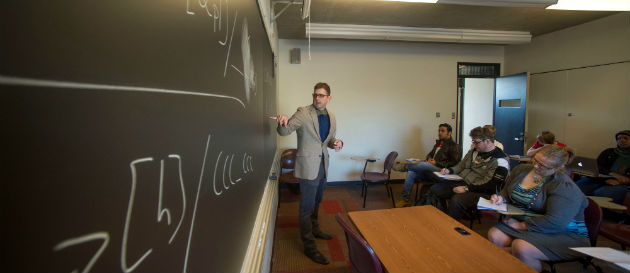
Theoretical Track
This track is the best option for those students who wish to move on to graduate work in Linguistics. The focus in this track is on providing a solid theoretical foundation in several subfields within Linguistics that will serve as the base for more advanced work at the graduate level.
Because the study of theoretical linguistics involves analysis of languages other than one’s native language, the theoretical linguistics track requires either one year of an uncommon or non-Western language or two years of any other non-English language. One year of an uncommon or non-Western language also satisfies the language requirement of the College of Liberal Arts. Students who choose to study a common, Western language satisfy the College of Liberal Arts requirement by taking the first year of that language and satisfy the Theoretical Linguistics language requirement by taking a second year of that language.
Core courses:
- LING 200 Language, Society and the Mind --OR-- LING 201 Language Diversity in the USA
- LING 300 Introduction to Descriptive Linguistics
- LING 405 Introduction to Phonological Theories
- LING 408 Introduction to Syntactic Theory
Theoretical Breadth (12 credit hours):
The Theoretical Linguistics track expects students to concentrate their coursework in areas that cover the most common sub-specializations pursued at the graduate level. To that end, students in this track choose four courses from the list of theoretically-oriented courses below with at least two of those courses coming from the sub-specializations list.
Sub-specializations (6 credit hours):
- LING 400 Introduction to Formal Semantics
- LING 402 Phonetics
- LING 406 Introduction to Historical Linguistics
- LING 415 Sociolinguistics
- LING 420 Introduction to Morphology
The remaining courses in the Theoretical Breadth category can come either from additional subspecialization courses (above) or from other theoretically-oriented courses (below).
Additional Theoretical Breadth courses (6 credit hours):
- LING 302 Invented Languages
- LING 320i Language, Gender, Power
- LING 328 Language and Law
- LING 404 American Dialects
- LING 410 Philosophy of Language
- LING 412 The Linguistic Structure of Japanese
- LING 416 Spanish in the USA
- LING 417 Language Contact
- LING 426 Gender, Culture & Language
- LING 430 Grammatical Structures
- LING 440 Topics in Linguistics (where appropriate)
- LING 445 Psycholinguistics
- LING 450 Language Families
- LING 452 Introduction to Linguistic Field Methods
Electives (9 credit hours):
The remaining 9 credit hours (3 courses) are chosen from any of the 300- or 400-level courses offered with a LING prefix. Up to six credit hours may be drawn from other programs with the prior approval of the Undergraduate Studies Coordinator in Linguistics.
Students who are interested in entering the Accelerated MA Program in Linguistics are encouraged to work with the Undergraduate and Graduate Advisors in Linguistics in planning their program of study. The Theoretical Linguistics track automatically provides the required coursework for entry into this Program, which reduces the required MA Linguistics coursework to 27 credit hours. Students working toward their BA degree on the Generalist track can also choose appropriate coursework for entry into this Program under the guidance of the Undergraduate Studies Coordinator in Linguistics.
